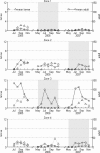Is mosquito larval source management appropriate for reducing malaria in areas of extensive flooding in The Gambia? A cross-over intervention trial
- PMID: 20133989
- PMCID: PMC2813154
- DOI: 10.4269/ajtmh.2010.09-0373
Is mosquito larval source management appropriate for reducing malaria in areas of extensive flooding in The Gambia? A cross-over intervention trial
Abstract
Larviciding to control malaria was assessed in rural areas with extensive seasonal flooding. Larval and adult mosquitoes and malaria incidence were surveyed routinely in four 100-km(2) areas either side of the Gambia River. Baseline data were collected in 2005. Microbial larvicide was applied to all water bodies by hand application with water-dispersible granular formulations and corn granules weekly from May to November in two areas in 2006 and in the other two areas in 2007 in a cross-over design. The intervention was associated with a reduction in habitats with late stage anopheline larvae and an 88% reduction in larval densities (P < 0.001). The effect of the intervention on mosquito densities was not pronounced and was confounded by the distance of villages to the major breeding sites and year (P = 0.002). There was no reduction in clinical malaria or anemia. Ground applications of non-residual larvicides with simple equipment are not effective in riverine areas with extensive flooding, where many habitats are poorly demarcated, highly mobile, and inaccessible on foot.
Figures





Comment in
-
Malaria elimination: when the tools are great but implementation falters.Am J Trop Med Hyg. 2010 Feb;82(2):174-5. doi: 10.4269/ajtmh.2010.09-0787. Am J Trop Med Hyg. 2010. PMID: 20133988 Free PMC article. No abstract available.
References
-
- World Health Organization . Global Strategic Framework for Integrated Vector Management. Geneva: World Health Organization; 2004.
-
- World Health Organization WHO position statement on integrated vector management. Wkly Epidemiol Rec. 2008;20:177–184. - PubMed
-
- Corbel V, Hougard JM, N’Guessan R, Chandre F. Evidence for selection of insecticide resistance due to insensitive acetylcholinesterase by carbamate-treated nets in Anopheles gambiae s.s. (Diptera: Culicidae) from Côte d’Ivoire. J Med Entomol. 2003;40:985–988. - PubMed
Publication types
MeSH terms
Grants and funding
LinkOut - more resources
Full Text Sources
Medical

